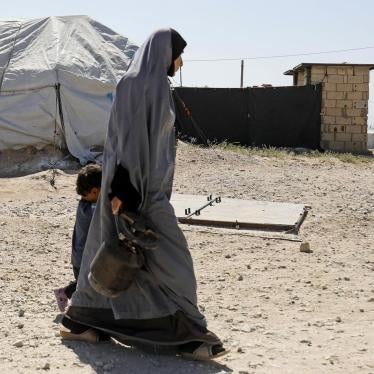Private Contractors and Violations of the Law in Iraq and Afghanistan
Private contractors (also known as private military or security contractors) provide a range of services for and on behalf of the US armed forces in Iraq and Afghanistan. Contractors prepare meals for soldiers, drive supply trucks, provide military training, and provide security for US civilian officials. Contractors – serving as interrogators and translators – have been linked to abuses at Abu Ghraib prison; and security contractors have been involved in numerous firefights in which there have been civilian casualties. Although the military use of contractors in the field dates back to the Revolutionary War, the US military in recent years has greatly increased its deployment of private contractors. As many as 180,000 contractors are currently believed to be in Iraq, and thousands more in Afghanistan. Several hundred have lost their lives.
Recent reports of alleged abuses by private US contractors raise a number of questions about how contractors can be held to account for abuse.
Can US contractors be prosecuted under domestic law in Iraq?
International law places legal obligations on states in areas under their jurisdiction or control to provide effective legal remedies for persons who have suffered violations of their fundamental rights. This includes state responsibility to investigate and prosecute serious human rights violations and violations of the laws of war by private persons and entities as well as by government officials and military personnel.
In June 2004, two days before the official end of the US military occupation of Iraq, the Coalition Provisional Authority (CPA) under Paul Bremer revised CPA Order 17 to provide immunity to foreign contractors from prosecution under Iraqi law. CPA Order 17 states: “Contractors shall be immune from Iraqi legal process with respect to acts performed by them pursuant to the terms and conditions of a Contract or any sub-contract thereto.” Contractors are defined as “non-Iraqi legal entities or individuals not normally resident in Iraq, including their non-Iraqi employees.”
Through this immunity provision, the United States effectively accepted responsibility for investigating and prosecuting criminal acts by foreign private contractors in Iraq. There are various legal options available to the United States to prosecute private contractors.
Although the CPA was dissolved in June 2004 with the transfer of governing authority to the Iraqis, several orders – including CPA Order 17 – continue to operate as the law of Iraq unless and until they are rescinded or superseded. Should the US continue to fail to ensure the legal protection of the civilian population from criminal acts by private contractors, Iraq would remain obligated to take necessary steps to fulfill its international legal responsibility to ensure remedies for criminal offenses.
Many foreign contractors are from countries besides the United States. CPA Order 17 allows contractors’ home states to waive their immunity from Iraqi prosecution. Human Rights Watch is unaware of any home states having waived immunity.1
Can US contractors be prosecuted under domestic law in Afghanistan?
The United States reportedly has an agreement with the Afghan government immunizing US contractors from prosecution by Afghanistan. As discussed above, however, international law obliges states to ensure that serious human rights violations and violations of the laws of war that take place in their jurisdiction are investigated and prosecuted. When the United States fails to effectively investigate and prosecute criminal acts by private contractors in Afghanistan, Afghanistan is obliged to take the necessary steps to fulfill its international legal responsibility to ensure remedies for criminal offenses.
Human Rights Watch is not aware of any similar agreements between other countries and Afghanistan that would protect third-party nationals working for US contractors from being prosecuted under Afghan law. In practice, however, it is difficult for the Afghan government to investigate and prosecute crimes carried out by third party nationals because of the immunity enjoyed by the employing company. Human Rights Watch is not aware of any instance in which a US company has cooperated with the Afghan government to facilitate the prosecution of a third party national under Afghan law.
What US laws could be used to prosecute private contractors who commit criminal acts?
To date, very few private contractors, including private security personnel, have been prosecuted for criminal offenses in Iraq, although allegations of criminal acts are widespread. There are a number of laws that could be used by US officials, depending on the offense and where it occurred, to prosecute private contractors.
Both the US War Crimes Act and the federal anti-torture statute permit the prosecution of crimes committed either by or against US nationals abroad.
- The War Crimes Act of 1996 (18 U.S.C. § 2441), as amended in 2006, makes it a criminal offense for US military personnel and US nationals to commit grave breaches of the 1949 Geneva Conventions and specified violations of Common Article 3 to the conventions, including torture and cruel and inhumane treatment. To date, no one has been prosecuted under the War Crimes Act.
- The federal anti-torture statute (18 U.S.C. § 2340A), enacted in 1994, provides for the prosecution of a US national or anyone present in the United States who, while outside the United States, commits or attempts to commit torture. The US has charged one person – the son of former Liberian leader Charles Taylor – under the anti-torture statute for his role in committing torture in Liberia.
Other laws expand the jurisdictional reach of an array of US criminal law to actions committed in specified areas and by specified persons overseas.
- The US Special Maritime and Territorial Jurisdiction (SMTJ) (18 U.S.C. § 7) allows for the prosecution of about 30 federal crimes – including murder, maiming, and assault – if committed by or against a US national on a US military base or facility overseas. However, crimes committed by contractors outside of US military bases and facilities cannot be prosecuted within the jurisdiction of the SMTJ. In addition, many employees of private contractors are not US nationals, so crimes that they commit against Iraqis or other non-US nationals would be not covered.
The US government relied on the SMTJ to convict David Passaro – a contractor working for the CIA – for committing assault with a dangerous weapon against a detainee at a US army base in Afghanistan in June 2003.2 To date, Passaro is the only contractor who has been convicted for abuse against an Iraqi or Afghan in custody.
- The Military Extraterritorial Jurisdiction Act (MEJA) (18 U.S.C. § 3261), allows for the prosecution of persons “employed by or accompanying the armed forces” overseas for crimes punishable by imprisonment of more than one year. Those “employed by . . . the armed forces” is defined to include Department of Defense (DOD) contractors and subcontractors as well as contractors and subcontractors of other federal agencies so long as the contract “relates to supporting the mission of the Department of Defense overseas.”3 Although the reach of the law has not yet been tested in court, many commentators believe that the law does not cover non-Defense Department contractors who are operating independently of US military operations. It is unclear, for example, whether MEJA could be used to prosecute Blackwater employees contracted to provide security for State Department missions, such as those allegedly involved in the shooting deaths of 11 unarmed civilians on September 16, 2007.
Human Rights Watch is aware of just one successful prosecution of a contractor under MEJA, when a DOD contractor pleaded guilty to the possession of child pornography in February 2007. The trial of another DOD contractor charged under MEJA for assaulting an Indian national in Iraq is scheduled for trial in January 2008.
Legislation pending before Congress (H.R. 2740 and S.674) would expand MEJA jurisdiction to cover all US government contractors operating in areas – such as Iraq and Afghanistan – where the armed forces are conducting what are known as “contingency operations.”4 The legislation also requires the Federal Bureau of Investigation to set up on-the-scene teams to investigate any allegations of contractor misconduct, which would greatly facilitate the ability of the Department of Justice to prosecute any criminal activity.
Can contractors be prosecuted under US military law?
Until 2007, the Uniform Code of Military Justice (UCMJ) only applied to US civilians “serving with or accompanying an armed force in the field” at a “time of war” – a phrase that the courts interpreted to mean a time of declared war. This precludes the prosecution of civilian contractors in Iraq and Afghanistan.
The UCMJ was revised as of January 1, 2007, to allow military jurisdiction “[i]n time of declared war or a contingency operation” over persons “serving with or accompanying an armed force in the field.”On September 25, 2007, Deputy Secretary of Defense Gordon England issued a directive to senior officers in the Pentagon, reminding them that all DOD contractors are subject to UCMJ jurisdiction and encouraging them to begin legal proceedings against those that have violated military law.
But the prosecution of civilian contractors under the UCMJ will likely be subject to challenge on constitutional grounds. The Supreme Court in Reid v. Covert (354 U.S. 1) (1957) and several others cases has held that the Constitution prohibits the prosecution of civilians by courts-martial because it would violate the right to a fair trial, including trial by jury.
Even if the Supreme Court were to uphold courts-martial of certain civilians, the impact on contractors abroad is unclear. Courts have generally adopted a narrow definition of the phrase “serving with or accompanying” the armed forces to require a direct connection with the activity of the armed forces. As a result it is unlikely that UCMJ jurisdiction could ever be asserted over non-DOD contractors. Moreover, the statute only extends UCMJ jurisdiction over those “in the field” – a term which also has been narrowly interpreted to include areas of actual fighting or where “actual hostilities” are underway.
The use of military courts to try civilians who are not part of the military raises serious human rights concerns. The United Nations Human Rights Committee, the body that monitors state compliance with the International Covenant on Civil and Political Rights, to which the US is party, has stated that the trial of civilians by military courts should be very exceptional and occur only under conditions that genuinely afford full due process.
1 Despite these considerations, no government should transfer any person to Iraqi authorities where there is a fear of torture. The torture of persons in Iraqi custody is widespread. Under the Convention against Torture, it would be unlawful for the United States or other government to transfer to Iraqi custody any person for whom there are substantial grounds for believing is in danger of being tortured.
2 Section 805 of the USA Patriot Act (Section 805 of P.L. 107-56, October 26, 2001, 115 Stat. 377) extended the SMTJ to cover US bases and facilities abroad with respect to offenses committed by or against a US national. The federal government relied on this newly-added provision in asserting jurisdiction over David Passaro.
3 18 U.S.C. section 3267(1)(A), as amended by the Ronald W. Reagan National Defense Authorization Act for FY 2005, P.L. 108-376 Section 1088 (118 Stat. 2066) (October 28, 2004).
4 Defined at 10 U.S.C. Section 101(13), “contingency operations” include all places where reservists are called to active duty or designated by the Secretary of Defense as places where members of the armed services may become involved in military actions against enemies of the United States.






